12 min read
Mastering Leadership Skills: Definition, Examples, and Resources
Whether you’re early in your career or have many years of experience, mastering leadership skills is not just a desirable trait; it’s necessary for...
9 min read
 Michelle Bennett
:
May 24, 2023 9:50:00 AM
Michelle Bennett
:
May 24, 2023 9:50:00 AM

Imagine a workplace where every employee feels valued, motivated, and empowered to do their best work. This ideal scenario doesn't happen by chance; it's the result of effective people management.
Effective people management plays a huge role in a positive environment at the workplace, employee satisfaction, retention, and overall organizational success.
In this article, we will look at what people management is, what are the people management skills, and how to implement those skills as a manager or leader.
We’ve also put together a list of statistics from recent research studies that reveal what those in people management are currently struggling with, what employees expect of their leaders, and what those leading people should be doing moving forward.
People management is all about one thing - people. It’s about ensuring the people in your charge have everything they need to do their job well. People management requires you to motivate, empower, develop your team, and advocate for.
However, this is complicated by the fact that people managers must also complete their own work, hit ambitious targets set by senior leadership, balance competing demands, manage conflicts and internal politics, implement new initiatives, and so on and so forth.
By definition, a people manager is someone who oversees people in the workplace. It doesn’t matter if you have one direct report or many, either way, you are a people manager, and if you’re to succeed in it, you need a specific skill set.
While managing people at the workplace is a challenging job, when done well, it can be rewarding for leaders, engaging for employees, and beneficial for the organizations they work for.
After all, your people management skills alongside the leadership skills will allow you to achieve your mandate by motivating, empowering, guiding, and supporting the employees in your charge.
People management skills, also known as soft skills or interpersonal skills, are all about how you interact, communicate, and lead others at work. This includes knowing how to handle employees who are either overly ambitious or lacking motivation.
For example, if you have an overly ambitious team member, you could help them set realistic goals which are helpful for the team. On the other hand, if someone is lacking motivation at the workplace, you might give them more support and guidance to get them back on track and excited about their work again.
People management skills are crucial for building positive relationships, resolving conflicts, and motivating team members.
While there are many, based on recent research, six people management skills you should be actively working to develop include:
While there are many, based on recent research, six people management skills you should be actively working to develop include:
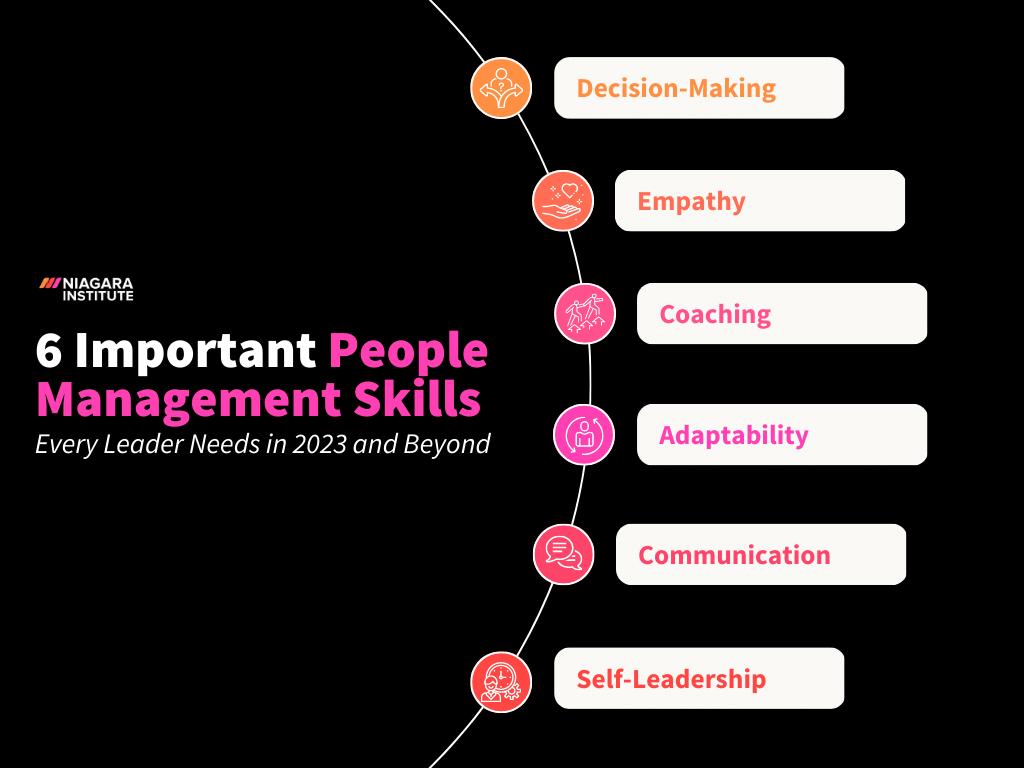
In 2022, decision-making was ranked one of the most important skills for those in people management to have in two completely separate studies. According to DDI, it’s one of the top five skills leaders themselves say they need to develop over the next three years. Employees, on the other hand, say a great manager is someone who has strong decision-making skills, is trustworthy, supportive, honest, and has a positive attitude (Zety).
Decision-making refers to one’s ability to seek out the facts, impartially weigh the benefits and consequences, draw a conclusion, and make a decision, even if it’s not the easy or popular one. It is informed by what we know, such as our business acumen which helps form a greater understanding of the consequences of decisions across an organization. It is also formed by experience. While you cannot fast-track your level of experience, you can advance your ability to make sound decisions by participating in development activities that provide general business knowledge and exposure to other people's decision-making processes.
Catalyst defines empathy as “the skill of connecting with others to identify and understand their emotions, thoughts, and perspectives, as well as demonstrates care, concern, and understanding for employees’ life circumstances.”
In 2023, this is a people management skill that one cannot afford to overlook. One reason is that employees are more stressed now than they were in 2020, which is concerning given that stress at work can lead to performance issues, demotivation, turnover, and even health problems. Fortunately, not only can empathy help reduce stress, but research from Catalyst has found that employees who work for empathetic leaders benefit in other key ways as well, such as:
While some people are more naturally empathetic than others, rest assured that empathy is learnable, like any other skill on this list. In fact, you can accelerate the learning process by investing in training that is specifically designed to build your confidence and equip you with practical tools you can rely on while on-the-job.
One people management skill that continues to grow in importance and popularity by the year is coaching. People managers with coaching skills guide, support, and empower their direct reports rather than command and control them. Harvard Business Review explained, “An effective manager-as-coach asks questions instead of providing answers, supports employees instead of judging them, and facilitates their development instead of dictating what has to be done.”
In fact, in 2021, Gallup even published an article titled, Gallup Finds a Silver Bullet: Coach Me Once Per Week, and that article stated: “Gallup has discovered, through studying what the best managers do differently, that great managing is an act of coaching, not one of directing and administrating.” Meanwhile, Gartner has found that employees who report to managers who are effective coaches are 40% more engaged, exhibit 38% more discretionary effort, and are 20% more likely to stay at their companies than those who weren’t led by ineffective coaches.
Two people management skills that go hand-in-hand are adaptability and resilience. In an article on the topic featured by the BBC, the difference between the two is clearly explained: “Adaptability isn’t just about surviving a change when it hits you - that’s resilience. To be truly adaptable, you need to be actively prepared for change, even advocate for it, and be consistently adding more capabilities into your repertoire so you can meet emerging needs.”
In a VUCA world that is as volatile, uncertain, complex, and ambiguous as ours, this could not be important if your goal isn’t just to survive but to truly thrive. Not to mention, adaptability is linked to greater personal growth, learning ability, confidence, and creative output, while resilience is associated with greater job satisfaction, work happiness, organizational commitment, and engagement.
Can adaptability and resilience be learned, though? According to Psychology Today, the answer is yes. They explain, “Many factors that determine resilience - such as genetics, early life experiences, and luck - can’t be modified. But specific resilience-building skills can be learned, including breaking out of negative thought cycles, pushing back against catastrophizing, and looking for upsides when faced with setbacks.”
Clear, concise, and inspiring communication is a fundamental people management skill. Yet, research has shown that it’s not as well-developed as it maybe should be. For instance, Harvard Business Review found that 69% of managers are not comfortable communicating with their employees. Meanwhile, in another study of 1,000 employees, 91% said their boss lacked communication skills. This is a cause for concern, given that a people leader’s ability to communicate can have a direct impact on employee engagement, motivation, and productivity.
Fortunately, with practice and coaching, a leader can develop these much-needed skills. As Bart Egnal, Chief Executive Officer of The Humphrey Group and a Niagara Institute partner, explains, “Leadership takes place through communication. Every leader knows the best ideas are useless if you cannot inspire others to act on them. That’s why it is key that you are intentional about how you prepare for and capitalize on every communication opportunity.”
Self-leadership refers to your ability to work independently, self-motivate, hold yourself accountable, own your mistakes, take control of your time, stay organized, and manage your output.
It’s a particularly important people management skill, given that employees look to you, their leader, for cues on what is acceptable vs. what isn’t in the workplace. They will then model their own actions, decisions, and words after the example you set for them. This begs the question: Are you modeling the behaviors you would want your employees to repeat?
Remember, as much as people management is about leading others, it’s about leading yourself too. So, invest the necessary time, leadership training, and energy into self-leadership. It’s as the well-known leadership coach and author John C. Maxwell wrote in his book, Leadership Gold: “Thomas J. Watson, the former chairman of IBM, said, ‘Nothing so conclusively proves one's ability to lead others, as what they do from day to day to lead themself.’ The smallest crowd you will ever lead is you, but it's the most important one. If you do that well, then you will earn the right to lead even bigger crowds.”
A great deal has changed for people managers over the last several years, and many have worked tirelessly to be the best leader they can be for their employees and organizations during this time.
However, recent research has shown that support from organizations can greatly benefit people in management roles, despite their achievements.
Employees say a great manager is someone who is honest, has a positive attitude, is trustworthy, supportive, and has strong decision-making skills. (Zety)
Currently, the top five things people say their leader lack is a clear vision, a sense of humor, strong interpersonal skills, supportiveness, and a positive attitude. (Zety)

61% of leaders report having more responsibilities at work since before the pandemic. This is a concern as it increases the odds of anxiety by 21% among leaders, which in turn, increases the odds of burnout by 520% and hurts the odds of engagement by 51%. (O.C. Tanner)
The top three most common leadership styles in 2022 were democratic, affiliative, and charismatic. (Niagara Institute)
Three things that North American employees say they need to thrive in the workplace are work that fulfills them, to feel valued, and to have a manager who advocates for them - all of which are things those in people management directly influence. (Mercer)
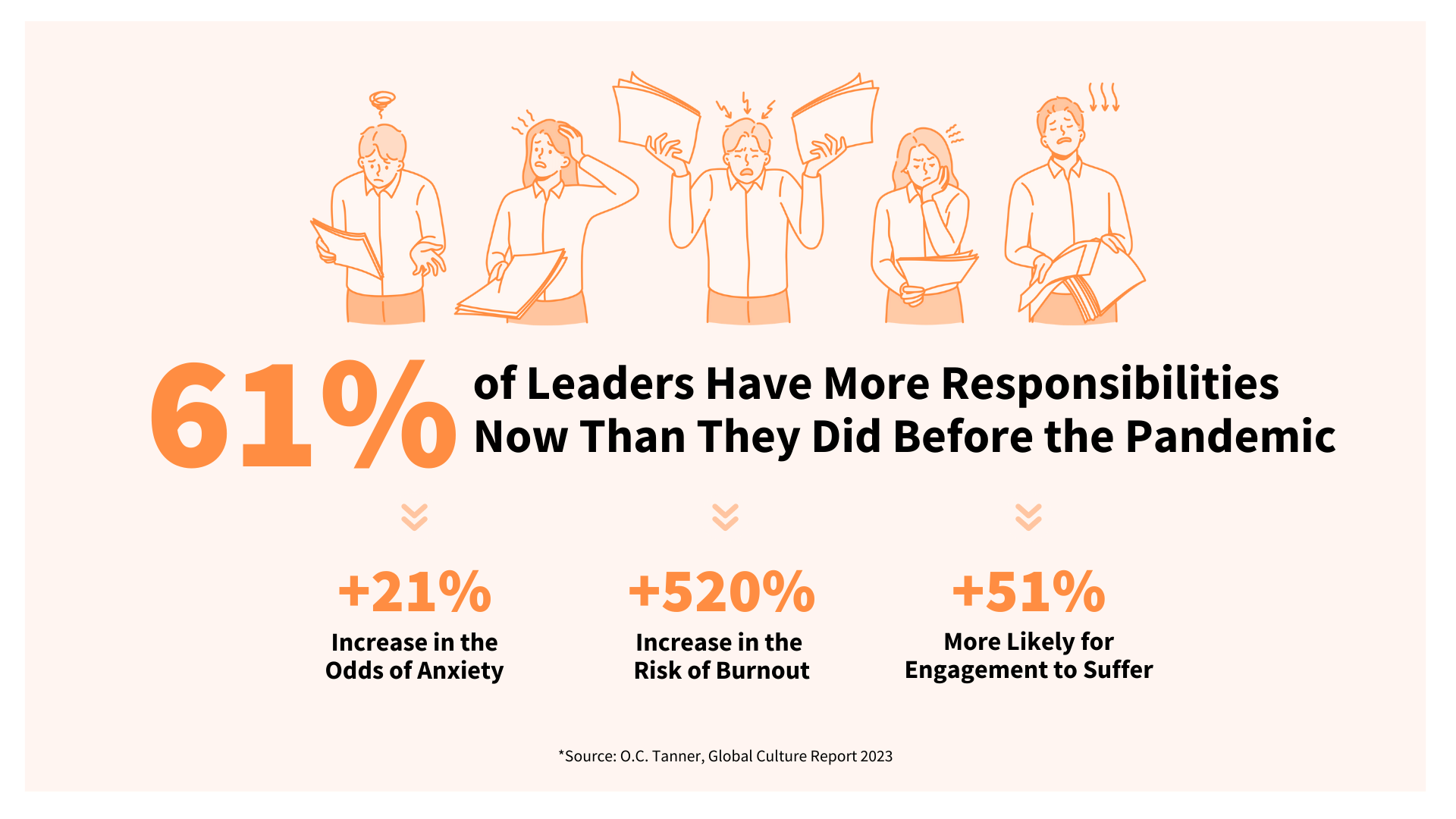
Only 27% of people managers report that they are very effective at leading hybrid/virtual teams. (DDI)
49% of hybrid managers say they struggle to trust their employees to do their best work, and 54% say they have less visibility into the work their employees do. (Microsoft)
79% of people leaders think they have a good sense of what their employees want, but only 48% of those employees agree. (O.C. Tanner)
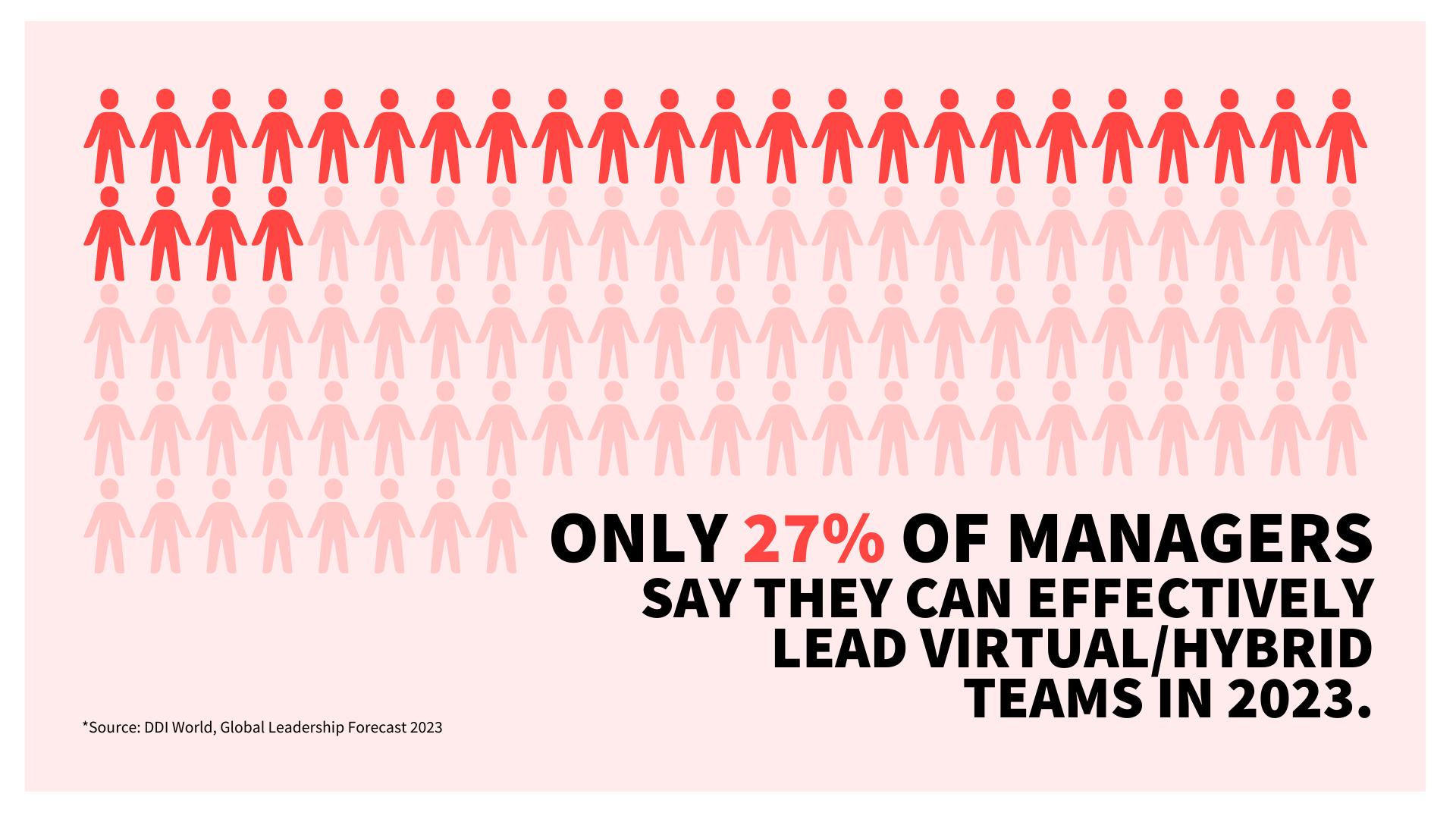
Only 15% of those in people management positions feel prepared to prevent employee burnout. (DDI)
Only 35% of HR leaders and 49% of employees say that leaders in their organizations have the capabilities they need to succeed in the future. (Gartner)
We looked at what recent research has found and what employees are saying about people management. These researches identify a number of actionable things that people managers and leaders exercise to succeed in the workplace.
Employees with an authentic manager are more likely to meet at least weekly and to discuss their well-being/mental health in their 1:1s. Meanwhile, 65% of employees whose manager isn’t authentic say they’re likely to face challenges getting the learning and development they need, especially when it’s not a priority for their manager. (Microsoft)
77% of respondents believe great managers should focus on making the most of the team members’ strengths. (Zety)
This shows how crucial it is for people managers to recognize and use the unique skills and talents of each team member. When you understand and harness these strengths, you can improve individual performance and create a more united and high-performing team.
According to studies, the top five skills leaders feel they need to develop in the next three years include developing talent, strategic thinking, leading change, decision-making, and influencing others. Yet, only 12% rate themselves as effective in all five, and only 29% of companies currently provide training for these skills. (DDI)
This shows there's a big gap between the skills leaders want to develop and the support they get to improve these important abilities. By closing this gap through targeted people management courses, you can feel more empowered to make meaningful changes and succeed in your role.
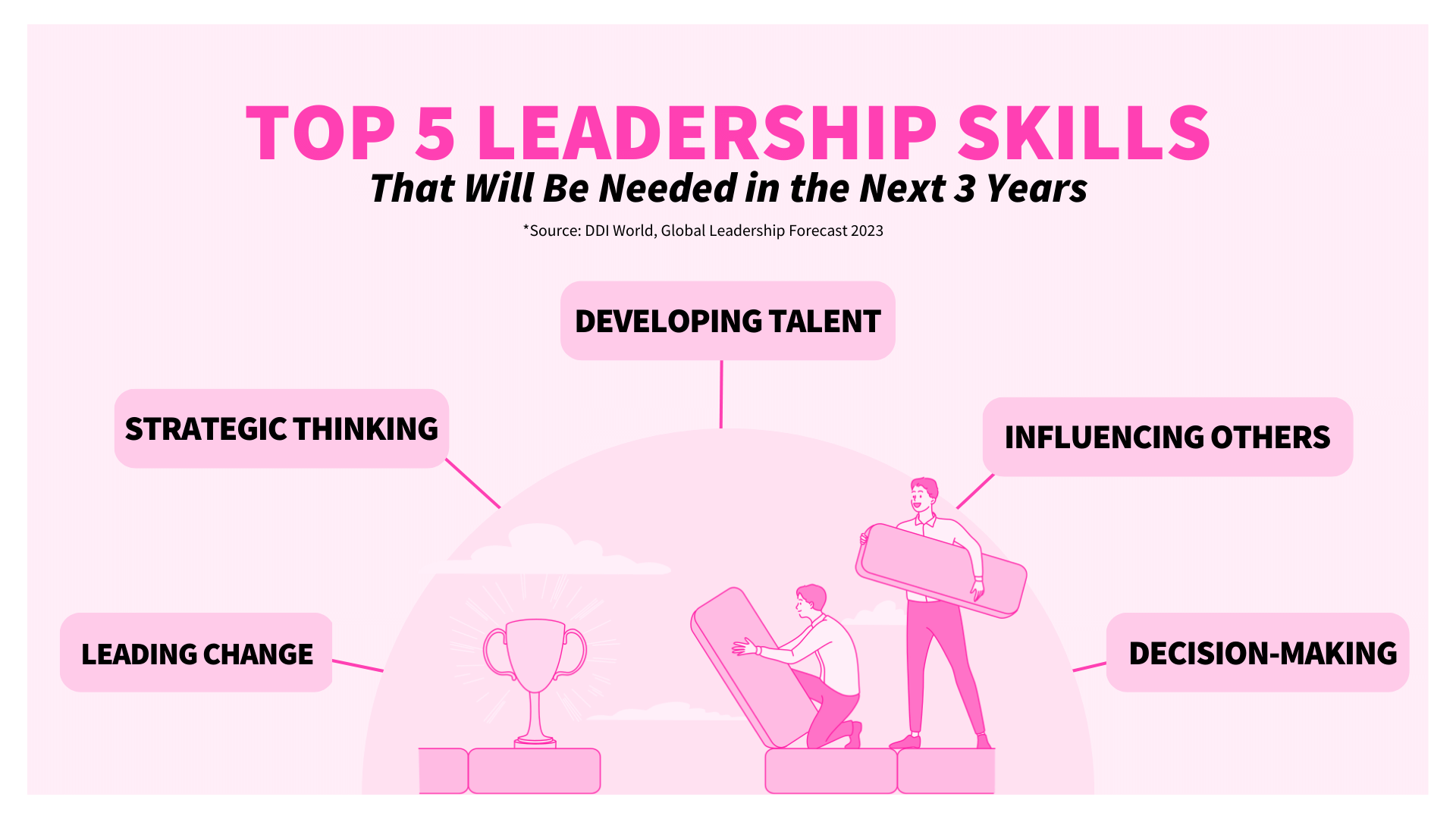
81% of employees say it’s important for their managers to help them prioritize their workload, but only 31% have ever been given clear guidance during one-on-ones on how to do so. (Microsoft)
This indicates a significant opportunity for people managers to improve their support in this area, which can lead to increased productivity and job satisfaction among their team members. Providing clear guidance and strategies for prioritization during one-on-one meetings can help your team members feel more empowered and focused in their work.
Leaders who regularly display vulnerability with their employees are 5.3x more likely to have employees who trust them. Also, if they genuinely acknowledge their failures or shortcomings, they’re 7.5x more likely to maintain trust over those that did not. (DDI)
These findings show the importance of authenticity and humility in leadership. By showing vulnerability and owning up to mistakes, leaders can build strong, trusting relationships with their teams, leading to higher morale and productivity.
82% of employees now say it’s important that their organizations see them as a whole person rather than simply as an employee. (Gartner).
When organizations recognize employees as individuals with their own needs and goals, it creates a workplace that feels more welcoming and supportive. This sense of understanding leads to higher levels of people management, including engagement and satisfaction among team members.
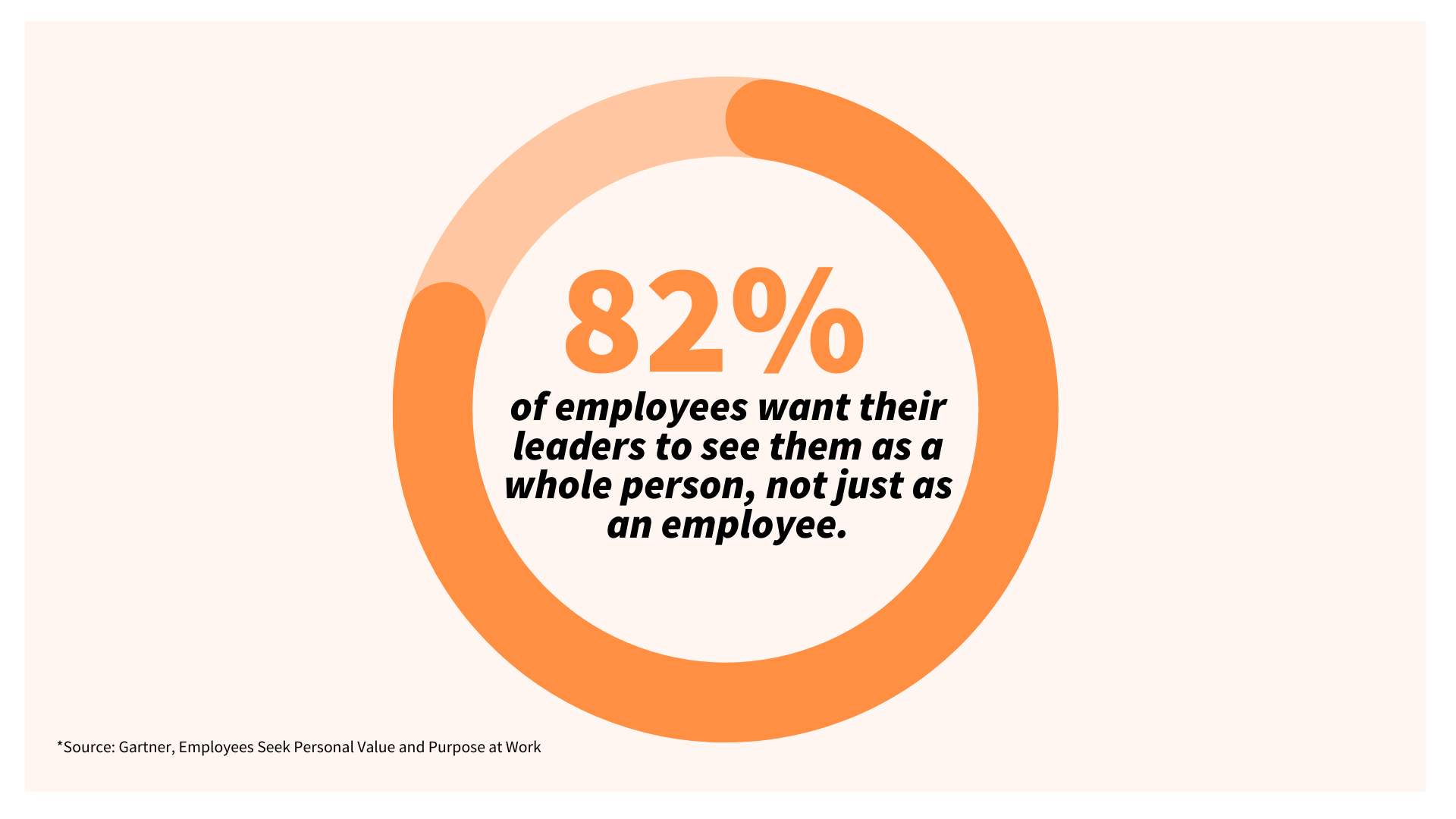
People managers who regularly provided constructive feedback to remote employees had 2.5x higher engagement rates. (DDI)
By prioritizing feedback, managers can help remote employees feel more connected, valued, and engaged in their work. This in turn, ultimately leads to better performance and job satisfaction at the workplace.
65% of leaders admit receiving more recognition from the people who report to them would improve their experience at work. (O.C. Tanner)
This shows that, when employees recognize and appreciate their leaders, it not only boosts the leaders' morale and satisfaction but also strengthens the overall relationship between leaders and their teams.
.png?width=1920&height=1080&name=People%20Management%20Needs%20to%20Give%20and%20Receive%20Feedback%20in%202023%20Statistic%20(1).png)
Over 50% of respondents expect their manager to be hands-on. (Zety)
A hands-on approach can help people managers better understand their team's challenges and strengths, leading to more effective leadership and a stronger, more cohesive team.
Employees whose direct managers have high emotional intelligence are 4x less likely to quit than those whose managers have low emotional intelligence. (Gallup)
This highlights the significant impact of emotional agility in leadership. People managers who possess this skill can better understand and connect with their team members, leading to higher levels of engagement, satisfaction, and retention among employees.
When leaders role model the behavior changes they’re asking employees to make (by spending time on the factory floor or in the call center, where work is done), change is 5.3x more likely to be successful. (McKinsey)
This underscores the importance of leading by example. When leaders actively demonstrate the behaviors they expect from their employees, it not only inspires confidence but also creates a more supportive and collaborative work environment, ultimately leading to greater success in implementing change management.

12 min read
Whether you’re early in your career or have many years of experience, mastering leadership skills is not just a desirable trait; it’s necessary for...

5 min read
The job of a supervisor is to manage employee and team performance, deliver results, promote best practices, and tackle challenges as they arise. For...

3 min read
If you’re just starting the process of finding communication skills training for either yourself or a group of employees or leaders you oversee, you...